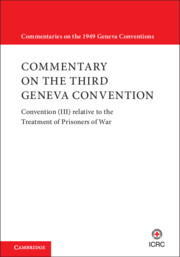 Commentary on the Third Geneva Convention
Commentary on the Third Geneva Convention from Section III - Labour of prisoners of war
Published online by Cambridge University Press: 21 August 2021
The issue of unhealthy or dangerous work, together with the questionwhether prisoners of war may be used for demining, was the topic of fiercedebate at the Diplomatic Conference in 1949. The drafting of Article 52 wasclosely linked to that of Article 50. While the latter provides anexhaustive list of categories of labour that prisoners of war may becompelled to do, the present article prohibits their employment on labourwhich is unhealthy or dangerous, unless they volunteer. The third paragraphof Article 52 makes clear that demining activities are to be considereddangerous labour, while the second paragraph provides that prisoners of warmay not be assigned to labour which would be considered humiliating for amember of the Detaining Power’s own forces.
To save this book to your Kindle, first ensure no-reply@cambridge.org is added to your Approved Personal Document E-mail List under your Personal Document Settings on the Manage Your Content and Devices page of your Amazon account. Then enter the ‘name’ part of your Kindle email address below. Find out more about saving to your Kindle.
Note you can select to save to either the @free.kindle.com or @kindle.com variations. ‘@free.kindle.com’ emails are free but can only be saved to your device when it is connected to wi-fi. ‘@kindle.com’ emails can be delivered even when you are not connected to wi-fi, but note that service fees apply.
Find out more about the Kindle Personal Document Service.
To save content items to your account, please confirm that you agree to abide by our usage policies. If this is the first time you use this feature, you will be asked to authorise Cambridge Core to connect with your account. Find out more about saving content to Dropbox.
To save content items to your account, please confirm that you agree to abide by our usage policies. If this is the first time you use this feature, you will be asked to authorise Cambridge Core to connect with your account. Find out more about saving content to Google Drive.